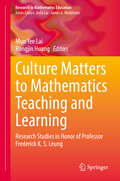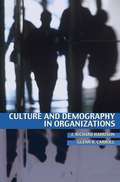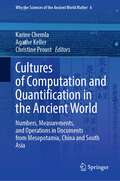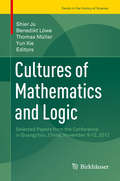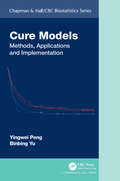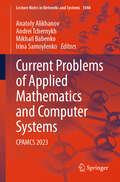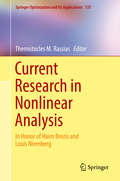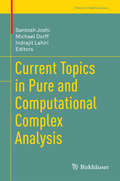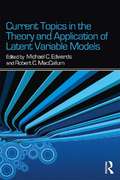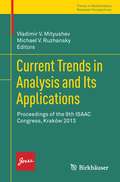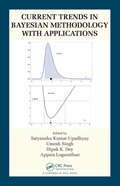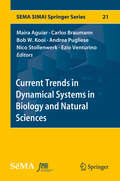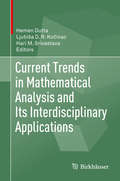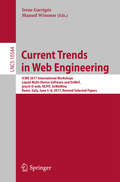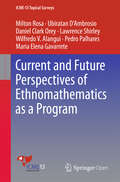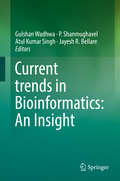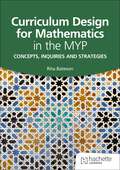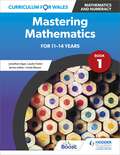- Table View
- List View
Culturally Specific Pedagogy in the Mathematics Classroom: Strategies for Teachers and Students
by Jacqueline LeonardAdvocating for the use of culturally specific pedagogy to enhance the mathematics instruction of diverse students, this revised second edition offers a wide variety of conceptual and curricular resources for teaching mathematics in a way that combats and confronts the forms of oppression that students face today. Addressing stratification based on race, class, and gender, Leonard offers lesson templates that teachers can use with ethnically and culturally diverse students and makes the link between research and practice. Connecting cutting-edge and emerging technologies to culturally specific pedagogy, the second edition features new chapters on mathematics and social justice, robotics, and spatial visualization. Applying a more expansive focus, the new edition discusses current movements such as Black Lives Matter and incorporates examples of rural and tribal students to paint a broader picture of what culturally rich mathematics classrooms actually look like. The text builds on sociocultural theory and research on culture and mathematics cognition to extend the literature and better understand minority students’ goals and learning needs. Including new discussion questions and new examples, lessons, and vignettes of integrating culture in the mathematics classroom, this book employs pedagogical research to field-test new instructional methods for culturally diverse and female students.
Culture Matters to Mathematics Teaching and Learning: Research Studies in Honor of Professor Frederick K. S. Leung (Research in Mathematics Education)
by Rongjin Huang Mun Yee LaiThis book, compiled in honor of Chair Professor Frederick K. S. Leung, contributes to revisiting, renewing and enriching the knowledge of cultural matters to mathematics education, widening the horizon in the use of cultural perspectives to explain the characteristics of classroom teaching and learning in East Asia, and to explain/re-interpret the differences in teacher knowledge and beliefs between East Asian and Western countries. Multiple research methods are used to explore how different cultures influence mathematics education. In particular, the book discusses the comparative studies of mathematics education, the influence of different cultures on mathematics teaching and learning, and the use of the Confucian Heritage Culture to explain the phenomenon of superior mathematics achievement of East Asian students. The research methods include qualitative approaches, quantitative approaches (such as structured equation modelling, exploratory factor analysis and confirmation factoranalysis), case studies and a meta-analysis of the literature review. This book is dedicated to Chair Professor Frederick K. S. Leung&’s (Hans Freudenthal Medallist 2013 and President of ICMI 2021-2024), one of the pioneers in investigating the cultural differences in mathematics education and establishing a framework for the relationship between cultures and mathematics educations. This book acknowledges his many contributions to the field and showcases promising research advancements that sparked directly or indirectly from his intellectual contributions to different mathematics educators globally.
Culture and Demography in Organizations
by Glenn R. Carroll J. Richard HarrisonHow do corporations and other organizations maintain and transmit their cultures over time? Culture and Demography in Organizations offers the most reliable and comprehensive answer to this complex question to date. The first book on the subject to ground its analysis in mathematical tools and computer simulation, it goes beyond standard approaches, which focus on socialization within organizations, by explicitly considering the effects of demographic processes of entry, exit, and organizational growth. J. Richard Harrison and Glenn R. Carroll base their analysis on a formal model with three components: hiring, socialization, and employee turnover. In exploring the model's implications through computer simulation methods, the authors cover topics such as organizational growth and decline, top management teams, organizational influence networks, terrorist organizations, cultural integration following mergers, and organizational failure. For each topic, they identify the conditions influencing cultural transmission. In general, they find that demographic processes play a central role in influencing organizational culture and that studying these processes leads to some surprising insights unavailable when considering socialization alone. This book, which also serves as an ideal introduction to the increasingly popular use of computer simulation, will be an indispensable resource for scholars and students of organization theory and behavior, cultural studies, strategic management, sociology, economics, and social simulation.
Cultures of Computation and Quantification in the Ancient World: Numbers, Measurements, and Operations in Documents from Mesopotamia, China and South Asia (Why the Sciences of the Ancient World Matter #6)
by Karine Chemla Agathe Keller Christine ProustThis book sheds light on the variety of mathematical cultures in general. To do so, it concentrates on cultures of computation and quantification in the ancient world, mainly in ancient China, South Asia, and the Ancient Near East and offers case studies focused on numbers, quantities, and operations, in particular in relation to mathematics as well as administrative and economic activities. The various chapters focus on the different ways and contexts of shaping numbers and quantities, and on the procedures applied to them. The book places special emphasis on the processes of emergence of place-value number systems, evidenced in the three geographical areas under study All these features yield essential elements that will enable historians of mathematics to further capture the diversity of computation practices in their contexts, whereas previous historical approaches have tended to emphasize elements that displayed uniformity within “civilizational” blocks. The book includes editions and translations of texts, some of them published here for the first time, maps, and conventions for editions of ancient texts. It thereby offers primary sources and methodological tools for teaching and learning. The volume is aimed at historians and philosophers of science and mathematics, historians of the ancient worlds, historians of economics, sinologists, indologists, assyriologists, as well as undergraduate, graduate students and teachers in mathematics, the history and philosophy of science and mathematics, and in the history of ancient worlds.
Cultures of Mathematics and Logic: Selected Papers from the Conference in Guangzhou, China, November 9-12, 2012 (Trends in the History of Science)
by Thomas Müller Benedikt Löwe Shier Ju Yun XieThis bookgathers the proceedings of the conference "Cultures of Mathematics andLogic," held in Guangzhou, China. The event was the third in a series ofinterdisciplinary, international conferences emphasizing the culturalcomponents of philosophy of mathematics and logic. It brought togetherresearchers from many disciplines whose work sheds new light on the diversityof mathematical and logical cultures and practices. In this context, thecultural diversity can be diachronical (different cultures in differenthistorical periods), geographical (different cultures in different regions), orsociological in nature.
Cure Models: Methods, Applications, and Implementation (Chapman & Hall/CRC Biostatistics Series)
by Binbing Yu Yingwei PengCure Models: Methods, Applications and Implementation is the first book in the last 25 years that provides a comprehensive and systematic introduction to the basics of modern cure models, including estimation, inference, and software. This book is useful for statistical researchers and graduate students, and practitioners in other disciplines to have a thorough review of modern cure model methodology and to seek appropriate cure models in applications. The prerequisites of this book include some basic knowledge of statistical modeling, survival models, and R and SAS for data analysis.The book features real-world examples from clinical trials and population-based studies and a detailed introduction to R packages, SAS macros, and WinBUGS programs to fit some cure models. The main topics covered include the foundation of statistical estimation and inference of cure models for independent and right-censored survival data, cure modeling for multivariate, recurrent-event, and competing-risks survival data, and joint modeling with longitudinal data, statistical testing for the existence and difference of cure rates and sufficient follow-up, new developments in Bayesian cure models, applications of cure models in public health research and clinical trials.
Current Challenges in Stability Issues for Numerical Differential Equations: Cetraro, Italy 2011, Editors: Luca Dieci, Nicola Guglielmi (Lecture Notes in Mathematics #2082)
by Wolf-Jürgen Beyn Luca Dieci Nicola Guglielmi Ernst Hairer Jesús María Sanz-Serna Marino ZennaroThis volume addresses some of the research areas in the general field of stability studies for differential equations, with emphasis on issues of concern for numerical studies. Topics considered include: (i) the long time integration of Hamiltonian Ordinary DEs and highly oscillatory systems, (ii) connection between stochastic DEs and geometric integration using the Markov chain Monte Carlo method, (iii) computation of dynamic patterns in evolutionary partial DEs, (iv) decomposition of matrices depending on parameters and localization of singularities, and (v) uniform stability analysis for time dependent linear initial value problems of ODEs. The problems considered in this volume are of interest to people working on numerical as well as qualitative aspects of differential equations, and it will serve both as a reference and as an entry point into further research.
Current Perspectives on Centenarians: Introduction to Lifespan and Healthspan (International Perspectives on Aging #36)
by Maria D. Llorente Raya Elfadel KheirbekThis book explores various aspects related to human longevity and aging beyond 100 years old. It examines all domains of health and well-being of this elite group including the current demographics, genetics and epigenetics of exceptional longevity, cardiovascular risk factors, dementia, nutrition, physical activity, African American and Hispanic centenarians, financial planning, religion, spirituality, whole health, wellness, oral health, and nature. The book also delves into the lives of supercentenarians, defined as expert survivors who have lived beyond 110 years old. The implications of the Age-Friendly Healthcare Systems (AFHS) Movement on the care of centenarians are also discussed. This book is a valuable resource for healthcare professionals, epidemiologists, public health professionals, policy makers, and anyone interested in the study of aging and longevity.
Current Problems of Applied Mathematics and Computer Systems: CPAMCS 2023 (Lecture Notes in Networks and Systems #1044)
by Andrei Tchernykh Irina Samoylenko Anatoly Alikhanov Mikhail BabenkoThis book is based on the best papers accepted for presentation during the International Conference on Current Problems of Applied Mathematics and Computer Systems (APAMCS-2023). The book includes research materials on mathematical problems and solutions in the field of scientific computing, artificial intelligence, data analysis and modular computing. The scope of numerical methods in scientific computing presents original research, including mathematical models and software implementations, related to the following topics: numerical methods in scientific computing; solving optimization problems; methods for approximating functions, etc. The studies in data analysis and modular computing include contributions in the field of deep learning, neural networks, mathematical statistics, machine learning methods, residue number system and artificial intelligence. In addition, some articles focus on mathematical modeling of nonlinear physical phenomena. Finally, the book gives insights into the fundamental problems in mathematics education. The book intends for readership specializing in the field of scientific computing, parallel computing, computer technology, machine learning, information security and mathematical education
Current Research in Nonlinear Analysis: In Honor of Haim Brezis and Louis Nirenberg (Springer Optimization and Its Applications #135)
by Themistocles M. RassiasCurrent research and applications in nonlinear analysis influenced by Haim Brezis and Louis Nirenberg are presented in this book by leading mathematicians. Each contribution aims to broaden reader’s understanding of theories, methods, and techniques utilized to solve significant problems. Topics include:Sobolev SpacesMaximal monotone operatorsA theorem of Brezis-NirenbergOperator-norm convergence of the Trotter product formulaElliptic operators with infinitely many variablesPseudo-and quasiconvexities for nonsmooth functionAnisotropic surface measuresEulerian and Lagrangian variablesMultiple periodic solutions of Lagrangian systemsPorous medium equationNondiscrete Lassonde-Revalski principleGraduate students and researchers in mathematics, physics, engineering, and economics will find this book a useful reference for new techniques and research areas. Haim Brezis and Louis Nirenberg’s fundamental research in nonlinear functional analysis and nonlinear partial differential equations along with their years of teaching and training students have had a notable impact in the field.
Current Topics in Pure and Computational Complex Analysis (Trends in Mathematics)
by Michael Dorff Santosh Joshi Indrajit LahiriThe book contains 13 articles, some of which are survey articles and others research papers. Written by eminent mathematicians, these articles were presented at the International Workshop on Complex Analysis and Its Applications held at Walchand College of Engineering, Sangli. All the contributing authors are actively engaged in research fields related to the topic of the book. The workshop offered a comprehensive exposition of the recent developments in geometric functions theory, planar harmonic mappings, entire and meromorphic functions and their applications, both theoretical and computational. The recent developments in complex analysis and its applications play a crucial role in research in many disciplines.
Current Topics in Summability Theory and Applications
by Hemen Dutta Billy E. RhoadesThis book discusses recent developments in and contemporary research on summability theory, including general summability methods, direct theorems on summability, absolute and strong summability, special methods of summability, functional analytic methods in summability, and related topics and applications. All contributing authors are eminent scientists, researchers and scholars in their respective fields, and hail from around the world. The book can be used as a textbook for graduate and senior undergraduate students, and as a valuable reference guide for researchers and practitioners in the fields of summability theory and functional analysis. Summability theory is generally used in analysis and applied mathematics. It plays an important part in the engineering sciences, and various aspects of the theory have long since been studied by researchers all over the world.
Current Topics in the Theory and Application of Latent Variable Models
by Michael C. Edwards Robert C. MacCallumThis book presents recent developments in the theory and application of latent variable models (LVMs) by some of the most prominent researchers in the field. Topics covered involve a range of LVM frameworks including item response theory, structural equation modeling, factor analysis, and latent curve modeling, as well as various non-standard data structures and innovative applications. The book is divided into two sections, although several chapters cross these content boundaries. Part one focuses on complexities which involve the adaptation of latent variables models in research problems where real-world conditions do not match conventional assumptions. Chapters in this section cover issues such as analysis of dyadic data and complex survey data, as well as analysis of categorical variables. Part two of the book focuses on drawing real-world meaning from results obtained in LVMs. In this section there are chapters examining issues involving assessment of model fit, the nature of uncertainty in parameter estimates, inferences, and the nature of latent variables and individual differences. This book appeals to researchers and graduate students interested in the theory and application of latent variable models. As such, it serves as a supplementary reading in graduate level courses on latent variable models. Prerequisites include basic knowledge of latent variable models.
Current Trends in Analysis and Its Applications: Proceedings of the 9th ISAAC Congress, Kraków 2013 (Trends in Mathematics)
by Vladimir V. Mityushev Michael V. RuzhanskyThis book is a collection of papers from the 9th International ISAAC Congress held in 2013 in Kraków, Poland. The papers are devoted to recent results in mathematics, focused on analysis and a wide range of its applications. These include up-to-date findings of the following topics: - Differential Equations: Complex and Functional Analytic Methods - Nonlinear PDE - Qualitative Properties of Evolution Models - Differential and Difference Equations - Toeplitz Operators - Wavelet Theory - Topological and Geometrical Methods of Analysis - Queueing Theory and Performance Evaluation of Computer Networks - Clifford and Quaternion Analysis - Fixed Point Theory - M-Frame Constructions - Spaces of Differentiable Functions of Several Real Variables Generalized Functions - Analytic Methods in Complex Geometry - Topological and Geometrical Methods of Analysis - Integral Transforms and Reproducing Kernels - Didactical Approaches to Mathematical Thinking Their wide applications in biomathematics, mechanics, queueing models, scattering, geomechanics etc. are presented in a concise, but comprehensible way, such that further ramifications and future directions can be immediately seen.
Current Trends in Bayesian Methodology with Applications
by Dipak K. Dey Satyanshu Kumar Upadhyay Umesh Singh Appaia LoganathanCollecting Bayesian material scattered throughout the literature, Current Trends in Bayesian Methodology with Applications examines the latest methodological and applied aspects of Bayesian statistics. The book covers biostatistics, econometrics, reliability and risk analysis, spatial statistics, image analysis, shape analysis, Bayesian computation, clustering, uncertainty assessment, high-energy astrophysics, neural networking, fuzzy information, objective Bayesian methodologies, empirical Bayes methods, small area estimation, and many more topics. Each chapter is self-contained and focuses on a Bayesian methodology. It gives an overview of the area, presents theoretical insights, and emphasizes applications through motivating examples. This book reflects the diversity of Bayesian analysis, from novel Bayesian methodology, such as nonignorable response and factor analysis, to state-of-the-art applications in economics, astrophysics, biomedicine, oceanography, and other areas. It guides readers in using Bayesian techniques for a range of statistical analyses.
Current Trends in Dynamical Systems in Biology and Natural Sciences (SEMA SIMAI Springer Series #21)
by Andrea Pugliese Ezio Venturino Maira Aguiar Carlos Braumann Bob W. Kooi Nico StollenwerkThis book disseminates the latest results and envisages new challenges in the application of mathematics to various practical situations in biology, epidemiology, and ecology. It comprises a collection of the main results presented at the Ninth Edition of the International Workshop “Dynamical Systems Applied to Biology and Natural Sciences – DSABNS”, held from 7 to 9 February 2018 at the Department of Mathematics, University of Turin, Italy. While the principal focus is ecology and epidemiology, the coverage extends even to waste recycling and a genetic application. The topics covered in the 12 peer-reviewed contributions involve such diverse mathematical tools as ordinary and partial differential equations, delay equations, stochastic equations, control, and sensitivity analysis. The book is intended to help both in disseminating the latest results and in envisaging new challenges in the application of mathematics to various practical situations in biology, epidemiology, and ecology.
Current Trends in Mathematical Analysis and Its Interdisciplinary Applications
by Hari M. Srivastava Hemen Dutta Ljubiša D. R. KočinacThis book explores several important aspects of recent developments in the interdisciplinary applications of mathematical analysis (MA), and highlights how MA is now being employed in many areas of scientific research. Each of the 23 carefully reviewed chapters was written by experienced expert(s) in respective field, and will enrich readers’ understanding of the respective research problems, providing them with sufficient background to understand the theories, methods and applications discussed. The book’s main goal is to highlight the latest trends and advances, equipping interested readers to pursue further research of their own. Given its scope, the book will especially benefit graduate and PhD students, researchers in the applied sciences, educators, and engineers with an interest in recent developments in the interdisciplinary applications of mathematical analysis.
Current Trends in Web Engineering: Icwe 2012 International Workshops Mdwe, Composableweb, Were, Qwe, And Doctoral Consortium, Berlin, Germany, July 2012, Revised Selected Papers (Lecture Notes In Computer Science / Information Systems And Applications, Incl. Internet/web, And Hci Ser. #7703)
by Manuel Wimmer Irene GarrigósThis book constitutes the refereed thoroughly refereed post-workshop proceedings of the 17th International Conference on Web Engineering, ICWE 2017, held in Rome, Italy, in June 2017.The 24 revised full papers were selected from 34 submissions. The workshops complement the main conference, and explore new trends on core topics of Web engineering. The workshop committee accepted five workshops of which the following four contributed papers to this volume: - 2nd International Workshop on Liquid Multi-Device Software and 1st International Workshop on Engineering the Web of Things - International Workshop on The Practice Of The Open Web (practi-O-web 2017) - 3rd International Workshop on Natural Language Processing for Informal Text (NLPIT 2017)- 3rd International Workshop on Mining the Social Web (SoWeMine 2017).
Current and Future Perspectives of Ethnomathematics as a Program (ICME-13 Topical Surveys)
by Milton Rosa Ubiratan D'Ambrosio Daniel Clark Orey Lawrence Shirley Wilfredo V. Alangui Pedro Palhares Maria Elena GavarreteThis surveyon the modernity of ethnomathematics addresses numerousthemes related both to ethnomathematics and culturally relevant pedagogy. Itoffers a broader view of mathematics, including ideas, concepts, procedures,processes, methods and practices rooted in distinct cultural environments. Inaddition, by reflecting on the social and political dimensions ofethnomathematics, another important aspect of this research program is thedevelopment of innovative approaches for a dynamic and globalizedsociety. Ethnomathematics recognizes that members of different culturesdevelop unique mathematical techniques, methods and explanations that allow foran alternative understanding and transformation of societal norms. Thetheoretical basis of ethnomathematics offers a valid alternative to traditionalstudies of history, philosophy, cognition and pedagogical aspects ofmathematics. Ethnomathematics' current agenda is to continue an ongoing,progressive trajectory that contributes to the achievement of social justice, peaceand dignity for all.
Current trends in Bioinformatics: An Insight
by Gulshan Wadhwa P. Shanmughavel Atul Kumar Singh Jayesh R. BellareThis book highlights the latest breakthrough developments in bioinformatics. It presents a series of timely, in-depth reviews, drug clinical trial studies, biodiversity informatics and thematic issues. In addition, it includes insightful reviews on advances in computational molecular/structural biology, which address areas such as computing in biomedicine and genomics, computational proteomics and systems biology, and metabolic pathway engineering. Innovations in these fields have direct impacts on key issues related to healthcare, medicine, genetic disorders, the development of agricultural products, renewable energy, and environmental protection. Written by respected leaders in the field and covering a wide range of topics involving the integration of biology with computer and information science, the book offers an ideal basis for teaching at the undergraduate and graduate levels. It can also be used for self-instruction by research investigators interested in applying bioinformatics-based analytical methods and information technologists working with academic and industrial laboratories.
Currents in Industrial Mathematics: From Concepts to Research to Education
by Helmut Neunzert Dieter Prätzel-WoltersThis book offers an insider's view of how industrial problems are translated into mathematics and how solving the mathematics leads to convincing industrial solutions as well. In 6 technical chapters, a wide range of industrial problems is modeled, simulated, and optimized; 4 others describe the modeling, computing, optimization, and data analysis concepts shaping the work of the Fraunhofer ITWM. Each technical chapter illustrates how the relevant mathematics has been adapted or extended for the specific application and details the underlying practical problem and resulting software. The final chapter shows how the use of mathematical modeling in the classroom can change the image of this subject, making it exciting and fun.
Curriculum Design for Mathematics in the MYP: Concepts, inquiries and strategies
by Rita BatesonEverything you will ever need to create an innovative, supportive MYP Mathematics Curriculum. Rita Bateson is the former Senior Curriculum and Assessment Manager for the IB and oversaw the last curriculum review. In this book you will find a one-stop shop for everything Middle Years Programme, from planning through delivery and assessment.
Curriculum Design for Mathematics in the MYP: Concepts, inquiries and strategies
by Rita BatesonEverything you will ever need to create an innovative, supportive MYP Mathematics Curriculum. Rita Bateson is the former Senior Curriculum and Assessment Manager for the IB and oversaw the last curriculum review. In this book you will find a one-stop shop for everything Middle Years Programme, from planning through delivery and assessment.
Curriculum for Wales: Mastering Mathematics for 11-14 years: Book 1
by Jonathan Agar Laszlo FedorCreate confident and capable mathematicians with accessible explanations and engaging activities.This book gradually builds on prior knowledge to deepen understanding through clear explanations, worked examples and hundreds of differentiated questions, as well as class activities.Designed to be used flexibly, this scheme covers the four 'what matters' statements and follows the five principles of progression from the Curriculum for Wales.- Develop pupils' conceptual understanding and communication with symbols throughout using plenty of worked examples and banded questions that get progressively more difficult- Target key skills using the fluency, logical reasoning and strategic competence markers- Engage pupils with a range of whole-class activities, including manipulatives and the 'concrete, pictorial, abstract' approach- Ease the transition between progression steps with skill-checker activities at the start of each topic and review questions after each chapter - Link topics to other areas of learning, such as Science and Technology, with cross-curricular activities and discussion points
Curriculum for Wales: Mastering Mathematics for 11-14 years: Book 2
by Jonathan Agar Laszlo FedorCreate confident and capable mathematicians with accessible explanations and engaging activities.This book gradually builds on prior knowledge to deepen understanding through clear explanations, worked examples and hundreds of differentiated questions, as well as class activities that you can choose from to build your lessons and teaching plan.Designed to be used flexibly, this scheme covers the four 'what matters' statements and follows the five principles of progression from the Curriculum for Wales.- Develop pupils' conceptual understanding and communication with symbols throughout using plenty of worked examples and banded questions that get progressively more difficult- Target fluency, logical reasoning and strategic competence by using the markers included in each exercise question- Improve outcomes by selecting from banded questions most suited to enable progression- Ease the transition between progression steps with skill-checker activities at the start of each topic and review questions after each chapter - Link topics to other areas of learning, such as Science and Technology, with cross-curricular activities and discussion points

